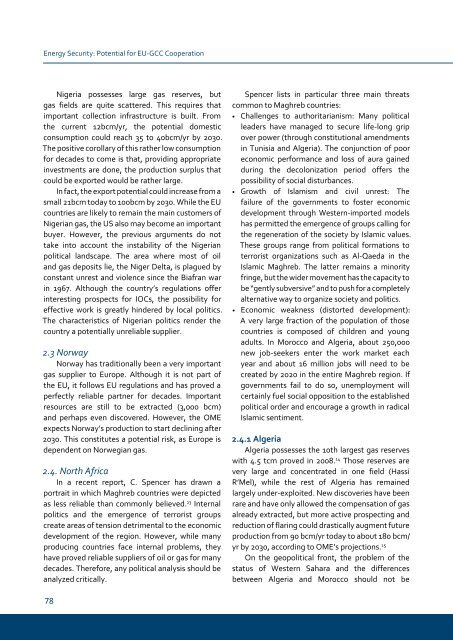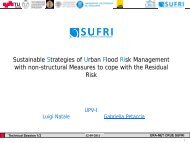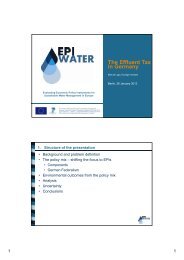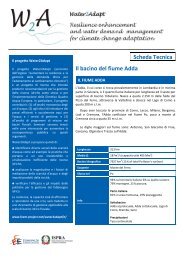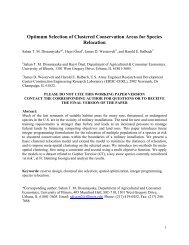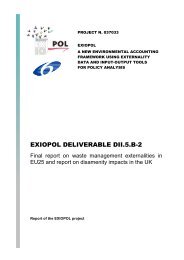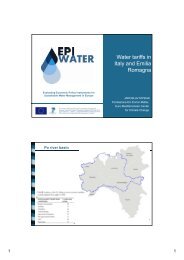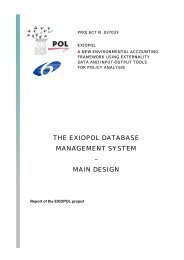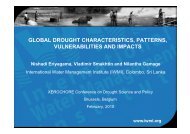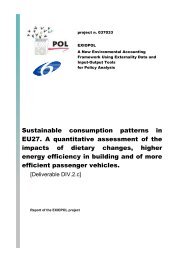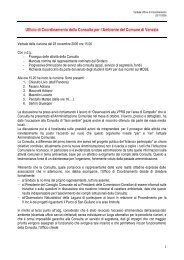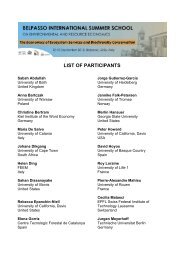Gulf and European Energy Supply Security - Feem-project.net
Gulf and European Energy Supply Security - Feem-project.net
Gulf and European Energy Supply Security - Feem-project.net
Create successful ePaper yourself
Turn your PDF publications into a flip-book with our unique Google optimized e-Paper software.
<strong>Energy</strong> <strong>Security</strong>: Potential for EU-GCC Cooperation<br />
Nigeria possesses large gas reserves, but<br />
gas fields are quite scattered. This requires that<br />
important collection infrastructure is built. From<br />
the current 12bcm/yr, the potential domestic<br />
consumption could reach 35 to 40bcm/yr by 2030.<br />
The positive corollary of this rather low consumption<br />
for decades to come is that, providing appropriate<br />
investments are done, the production surplus that<br />
could be exported would be rather large.<br />
In fact, the export potential could increase from a<br />
small 21bcm today to 100bcm by 2030. While the EU<br />
countries are likely to remain the main customers of<br />
Nigerian gas, the US also may become an important<br />
buyer. However, the previous arguments do not<br />
take into account the instability of the Nigerian<br />
political l<strong>and</strong>scape. The area where most of oil<br />
<strong>and</strong> gas deposits lie, the Niger Delta, is plagued by<br />
constant unrest <strong>and</strong> violence since the Biafran war<br />
in 1967. Although the country’s regulations offer<br />
interesting prospects for IOCs, the possibility for<br />
effective work is greatly hindered by local politics.<br />
The characteristics of Nigerian politics render the<br />
country a potentially unreliable supplier.<br />
2.3 Norway<br />
Norway has traditionally been a very important<br />
gas supplier to Europe. Although it is not part of<br />
the EU, it follows EU regulations <strong>and</strong> has proved a<br />
perfectly reliable partner for decades. Important<br />
resources are still to be extracted (3,000 bcm)<br />
<strong>and</strong> perhaps even discovered. However, the OME<br />
expects Norway’s production to start declining after<br />
2030. This constitutes a potential risk, as Europe is<br />
dependent on Norwegian gas.<br />
2.4. North Africa<br />
In a recent report, C. Spencer has drawn a<br />
portrait in which Maghreb countries were depicted<br />
as less reliable than commonly believed. 13 Internal<br />
politics <strong>and</strong> the emergence of terrorist groups<br />
create areas of tension detrimental to the economic<br />
development of the region. However, while many<br />
producing countries face internal problems, they<br />
have proved reliable suppliers of oil or gas for many<br />
decades. Therefore, any political analysis should be<br />
analyzed critically.<br />
Spencer lists in particular three main threats<br />
common to Maghreb countries:<br />
• Challenges to authoritarianism: Many political<br />
leaders have managed to secure life-long grip<br />
over power (through constitutional amendments<br />
in Tunisia <strong>and</strong> Algeria). The conjunction of poor<br />
economic performance <strong>and</strong> loss of aura gained<br />
during the decolonization period offers the<br />
possibility of social disturbances.<br />
• Growth of Islamism <strong>and</strong> civil unrest: The<br />
•<br />
failure of the governments to foster economic<br />
development through Western-imported models<br />
has permitted the emergence of groups calling for<br />
the regeneration of the society by Islamic values.<br />
These groups range from political formations to<br />
terrorist organizations such as Al-Qaeda in the<br />
Islamic Maghreb. The latter remains a minority<br />
fringe, but the wider movement has the capacity to<br />
be “gently subversive” <strong>and</strong> to push for a completely<br />
alternative way to organize society <strong>and</strong> politics.<br />
Economic weakness (distorted development):<br />
A very large fraction of the population of those<br />
countries is composed of children <strong>and</strong> young<br />
adults. In Morocco <strong>and</strong> Algeria, about 250,000<br />
new job-seekers enter the work market each<br />
year <strong>and</strong> about 16 million jobs will need to be<br />
created by 2020 in the entire Maghreb region. If<br />
governments fail to do so, unemployment will<br />
certainly fuel social opposition to the established<br />
political order <strong>and</strong> encourage a growth in radical<br />
Islamic sentiment.<br />
2.4.1 Algeria<br />
Algeria possesses the 10th largest gas reserves<br />
with 4.5 tcm proved in 2008. 14 Those reserves are<br />
very large <strong>and</strong> concentrated in one field (Hassi<br />
R’Mel), while the rest of Algeria has remained<br />
largely under-exploited. New discoveries have been<br />
rare <strong>and</strong> have only allowed the compensation of gas<br />
already extracted, but more active prospecting <strong>and</strong><br />
reduction of flaring could drastically augment future<br />
production from 90 bcm/yr today to about 180 bcm/<br />
yr by 2030, according to OME’s <strong>project</strong>ions. 15<br />
On the geopolitical front, the problem of the<br />
status of Western Sahara <strong>and</strong> the differences<br />
between Algeria <strong>and</strong> Morocco should not be


